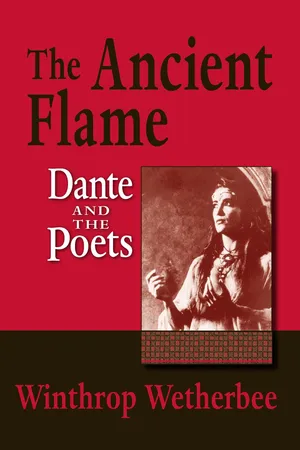
- 320 pages
- English
- PDF
- Available on iOS & Android
About this book
While the structure and themes of the Divine Comedy are defined by the narrative of a spiritual pilgrimage guided by Christian truth, Winthrop Wetherbee's remarkable new study reveals that Dante's engagement with the great Latin poets Vergil, Ovid, Lucan, and Statius constitutes a second, complementary narrative centered on psychological and artistic self-discovery.
This fresh, illuminating approach departs from the usual treatment of classical poets in Dante criticism, which assigns them a merely allegorical function. Their true importance to Dante's project is much greater. As Wetherbee meticulously shows, Dante's use of the poets is grounded in an astute understanding of their historical situation and a deeply sympathetic reading of their poetry.
Dante may have been motivated to correct pagan thought and imagery, but more pervasive was his desire to recreate classical style and to restore classical auctoritas to his own times. Dante's journey in the Commedia, beginning with the pilgrim's assumption of a tragic view of the human condition, progresses with the great poetry of the classical past as an intrinsic component of—not just a foil to—the spiritual experience. Dante ultimately recognizes classical poetry as an essential means to his discovery of truth.
A stunning contribution by one of the nation's leading medievalists, Wetherbee's investigation of the poem's classicism makes possible an ethical and spiritual but non-Christian reading of Dante, one that will spur new research and become an indispensable tool for teaching the Commedia.
Frequently asked questions
- Essential is ideal for learners and professionals who enjoy exploring a wide range of subjects. Access the Essential Library with 800,000+ trusted titles and best-sellers across business, personal growth, and the humanities. Includes unlimited reading time and Standard Read Aloud voice.
- Complete: Perfect for advanced learners and researchers needing full, unrestricted access. Unlock 1.4M+ books across hundreds of subjects, including academic and specialized titles. The Complete Plan also includes advanced features like Premium Read Aloud and Research Assistant.
Please note we cannot support devices running on iOS 13 and Android 7 or earlier. Learn more about using the app.
Information
Table of contents
- Cover
- Series List
- Title Page
- Copyright
- Contents
- Series Page
- Preface
- 1. Introduction
- 2. Vergil in the Inferno
- 3. Lucan and Vergil
- 4. Cato’s Grotto
- 5. Ovid and Vergil in Purgatory
- 6. Statius
- 7. Lust, Poetry, andthe Earthly Paradise
- 8. Paradiso
- Bibliography
- Index of Passages Discussed
- General Index